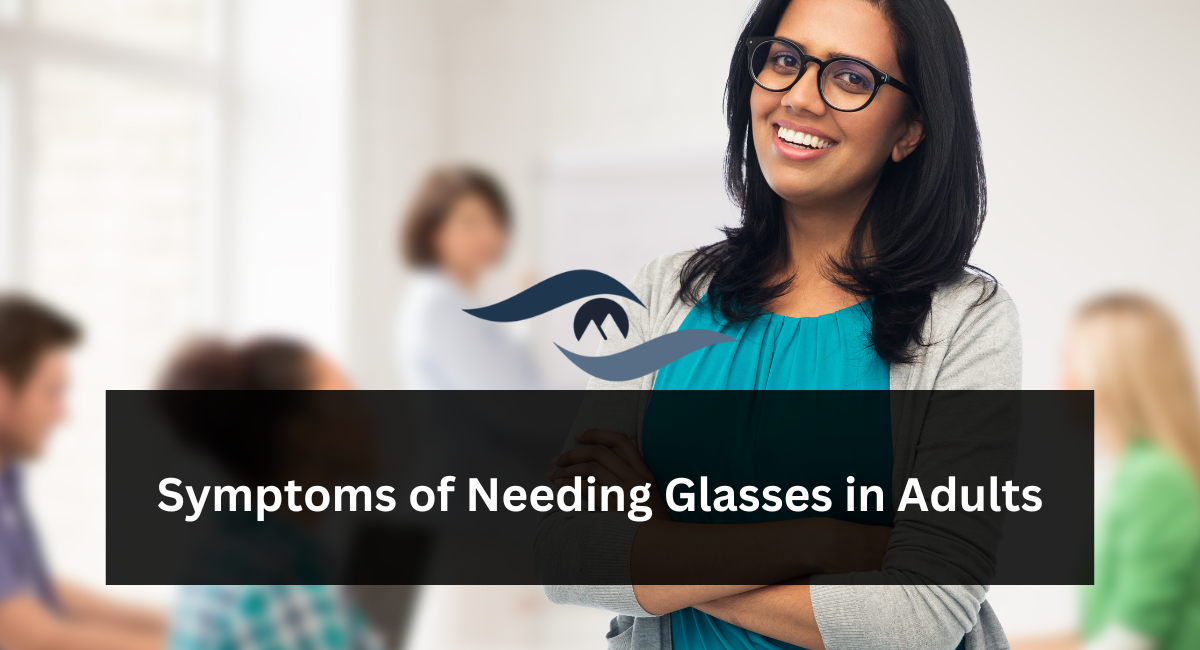As we get older, our eyesight might change, and it’s typical to acquire vision issues that need glasses or contacts. However, identifying the indications that you may want glasses isn’t always simple.
In this blog post, we will examine the typical signs of requiring glasses in adults using straightforward language, assisting you in comprehending when it may be appropriate to get an eye examination and contemplate wearing spectacles for improved vision.
Blurred Vision:
One of the most apparent signs of requiring glasses is blurred vision, where objects seem unclear or not in sharp focus. You may encounter difficulty in reading small text, perceiving distant signs accurately, or discerning details in your environment.
Unclear eyesight can happen at any range and might get worse gradually if not treated.
Trouble seeing or Seeing Things Close Up:
If you’re having difficulty seeing books, newspapers, or digital screens up close, it may be a sign of presbyopia—a common disorder that affects near vision as people age.
You could notice that you have to hold reading materials further away in order to see them clearly, or that you have eye strain and headaches when you focus on close-up chores for long periods of time.
Squinting:
Squinting is a natural reaction to attempt to enhance focus and clarity when eyesight is hindered. You may find yourself squinting more frequently, particularly in strong light or when attempting to view items that are far away.
Although squinting can provide a temporary improvement in vision by decreasing the quantity of light that enters the eye, it is not a permanent solution and could suggest the necessity for corrective lenses.
Eye Tiredness and Exhaustion:
Exerting effort to get clear vision might cause additional pressure on your eyes, resulting in signs of eye tiredness and exhaustion.
You might feel some discomfort, burning sensations, or aching around your eyes, particularly after long periods of reading, using digital gadgets, or doing visually demanding tasks.
Headaches:
Regular headaches, especially in the area of the forehead, temples, or the back of the head, may indicate untreated visual issues.
Exerting extra effort to see clearly due to vision problems might cause headaches or migraines, affecting your daily well-being and efficiency.
Driving Challenges at Night:
If you have trouble seeing properly when driving at night, it may suggest a requirement for glasses, particularly if you encounter glare from headlights, halos around lights, or poor visibility in low-light situations.
Having difficulty seeing at night can be a safety issue and should be dealt with quickly to avoid accidents.
Double Vision:
Perceiving two images instead of one, distinct image can be confusing and may suggest underlying vision problems that need to be addressed.
Double vision, sometimes called diplopia, can happen when the eyes are not properly aligned or when there are issues with the cornea, lens, or eye muscles.
Alterations in Color Perception:
Although less frequent, modifications in color vision can nonetheless suggest visual issues.
Having trouble telling apart particular colors or noting changes in how colors look can indicate problems with the retina or optic nerve, which may require a thorough eye examination.
Regular Eye Rubbing:
If you often massage your eyes to relieve discomfort or enhance clarity, it can indicate underlying vision issues.
Excessive rubbing of your eyes can worsen feelings of dryness, irritation, and blurred vision, and may suggest the need for corrective lenses to treat underlying vision problems.
Challenges Adapting to Various Lighting Conditions:
Having trouble adjusting to different lighting situations, such going from inside to outside or moving from bright to dark spaces, may indicate vision issues.
Your vision may require more time to adapt, and you may notice heightened sensitivity to strong light or changes in lighting conditions, which can affect how comfortable and clear your vision is.
Adjusting the Position of Your Head to Improve Vision:
If you notice that you are changing the angle or direction of your head to enhance your ability to see clearly, it may suggest an unevenness in your eyesight that needs to be addressed.
Adjusting the position of your head might briefly change the direction of light that enters your eyes, which might enhance your vision of specific objects or details.
Impaired Depth Perception:
Trouble in accurately perceiving distances or evaluating depth can indicate vision issues that impact binocular vision—the ability of both eyes to collaborate in forming a unified, three-dimensional image.
Diminished ability to judge distances can influence your sense of space and ability to coordinate, which can have an impact on tasks like driving, participating in sports, and traversing stairs or uneven surfaces.
Experiencing a sense of imbalance or dizziness:
Vision is important for maintaining balance and spatial orientation, therefore any changes in visual acuity or depth perception might impact your sense of balance and stability.
If you feel dizzy, confused, or unstable, especially together with vision-related symptoms, it’s important to deal with possible vision problems.
Family Background of Vision Abnormalities:
Having a family background with vision abnormalities, such nearsightedness, farsightedness, astigmatism, or other refractive flaws, can raise the likelihood of experiencing similar problems.
If your parents, siblings, or other close relatives wear glasses or have had changes in their eyesight, you might also have a higher chance of needing corrective lenses.
Conclusion
It is important to be aware of the signs that indicate the need for glasses in adults in order to preserve good eye health and clear vision.
If you have any of the symptoms mentioned earlier, feel free to make an appointment for an eye check-up with an eye doctor.
An extensive eye examination can assist in detecting underlying vision issues, determining the suitable prescription for corrective eyeglasses, and addressing any further concerns related to eye health.
By actively adopting measures to meet your vision needs, you can experience better, more comfortable vision and enhance your entire quality of life.
